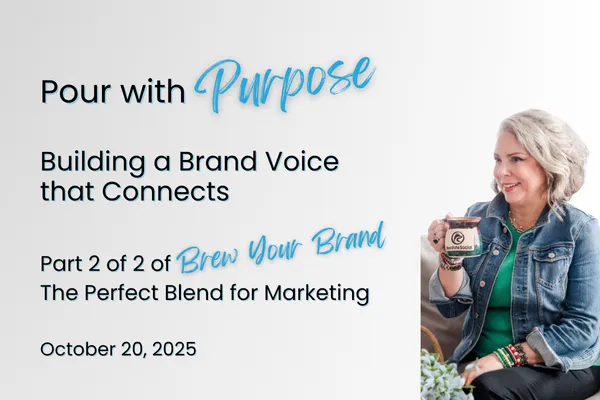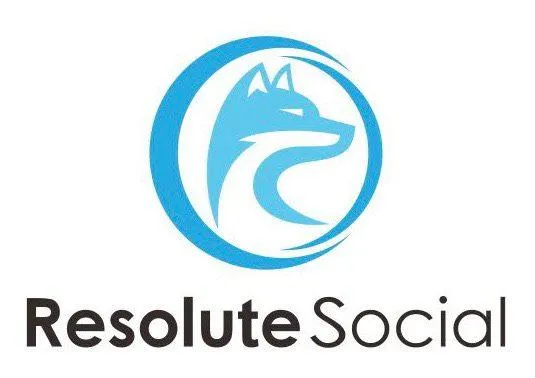
Pour with Purpose: Bulding a Brand Voice that Connects
Buckle up and grab a double shot — it's time to serve Part 2: Pour With Purpose — Building a Brand Voice That Connects. This is where we take all that beautiful brand clarity from Part 1 and translate it into voice, vibe, visuals, and strategy that actually does something on social media.
Let’s talk about what happens after the brew. Once you’ve nailed your message and market, the next step is making sure your audience feels you before they even read the caption. It’s not enough to know who you are — you’ve gotta show up in a way that sounds like you, looks like you, and most importantly, connects with the people you’re trying to serve.
Because if Part 1 was your espresso shot of clarity — this one is your signature pour. The one that makes people say, “Yes — that’s exactly what I needed.”
☕ Step 1: What Do You Want to Be Known For?
Before you worry about fonts, filters, or trying to sound like someone else, pause and ask:
What feeling do I want to create every time someone interacts with my brand?
What words do I want people to associate with my business?
What result do I consistently deliver that makes people come back for more?
This is your brand aroma. The vibe that lingers. Get intentional about what people walk away remembering.
☕ Step 2: Define Your Voice — Then Stick With It
Your brand voice is your pour — it’s how you show up in words, tone, visuals, and even timing. It's your personality, steeped into every post.
Are you:
✨ Nurturing & supportive?
✨ Bold & energetic?
✨ Smart & educational?
✨ Chill & conversational?
Whatever your flavor — pick it and commit. Don’t try to be a caramel macchiato one day and a black cold brew the next.
Show up like a consistent cup of YOU.
☕ Step 3: Align Your Vibe With Visuals
You don’t need a rebrand — you need consistency.
Think:
Logo versions
Color palette
Filters or photo style
Fonts
Visual metaphors or props
These things aren’t fluff — they’re memory anchors. Your visuals are the creamer to your copy: they make your message stick.
☕ Step 4: Create Content That Leads Somewhere
This is where most people spill the cup. They post with personality, but no purpose.
Ask yourself:
What do I want my content to do for my business?
Do I want people to visit my website? Book a call? Save the post?
Am I making it easy for people to take the next sip?
Posting for the sake of posting is just noise. Pour with purpose — know what you want your content to do and invite your audience to take action clearly and consistently.
☕ Key Takeaway:
Once you know what you do and who you do it for — your job is to serve it up with soul. Your voice is the pour. Your visuals are the mug. Your content is the invitation.
Clarity gets attention. Consistency builds trust. Purpose leads to action.
☕ Hooks That Require Brand Clarity
(For your audience to use — broken into Awareness, Education/FAQ, and Conversion)
☕ Awareness Hooks
These catch attention, signal purpose, and only work if the business owner knows what they do and who they serve.
“I work with [niche] who are tired of [common frustration] and ready for [desired outcome].”
“If [pain point] is keeping you up at night, this is for you.”
“Most people don’t realize [surprising truth about the problem you solve]. That’s where I come in.”
“Here’s what happens when you stop guessing and get a strategy built for [your audience].”
“I’m not for everyone — but if you’re [audience quality], keep reading.”
☕ FAQ / Educational Hooks
These teach through clarity — they explain what someone does, why it matters, and how it works.
“No, I don’t just [surface-level task] — I help [audience] [achieve transformation].”
“Let’s clear this up: [your offer] isn’t about [misconception]. It’s about [real benefit].”
“You don’t need [generic solution]. You need [your specific offer], built for [your niche].”
“Here’s why [pain point] keeps showing up — and how I fix it.”
“What I do isn’t magic. It’s [simple description of offer] that creates [measurable result].”
☕ Conversion Hooks
These move people from interested to engaged. They only work if the business owner has clearly defined calls-to-action and a specific result they offer.
“I help [audience] go from [pain point] to [result] in [timeline], using [method].”
“If you’re done with [pain point], book a call and let’s fix it.”
“You don’t have to stay stuck. My [offer] is designed to get you [specific benefit] — fast.”
“Let’s take [problem] off your plate. Here’s how we do it → [CTA].”
“You’ve waited long enough. Here’s what happens when you say yes to [your solution].”


